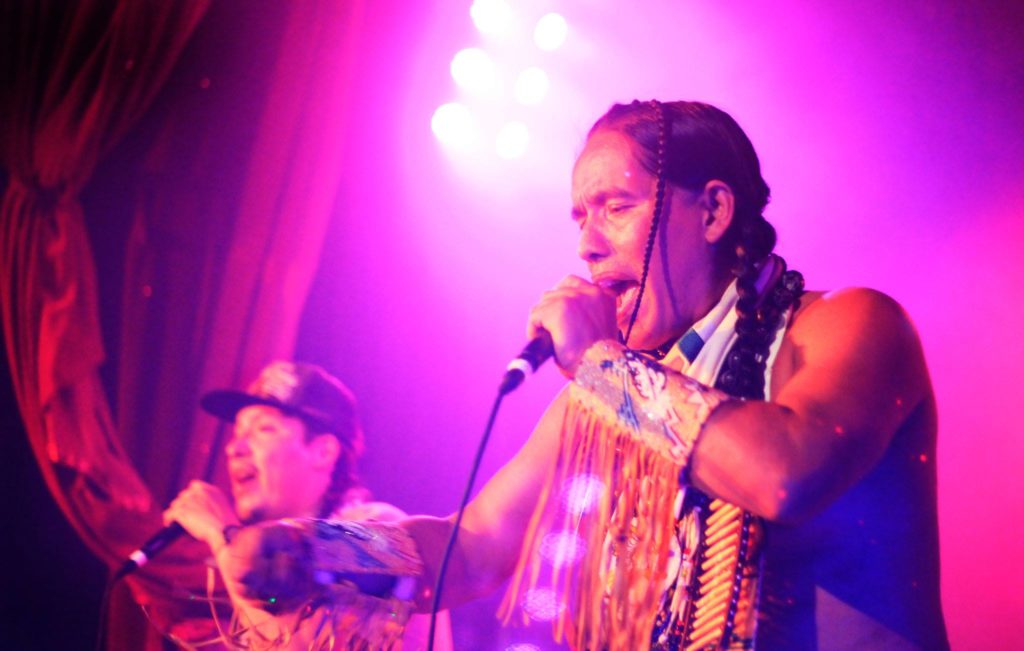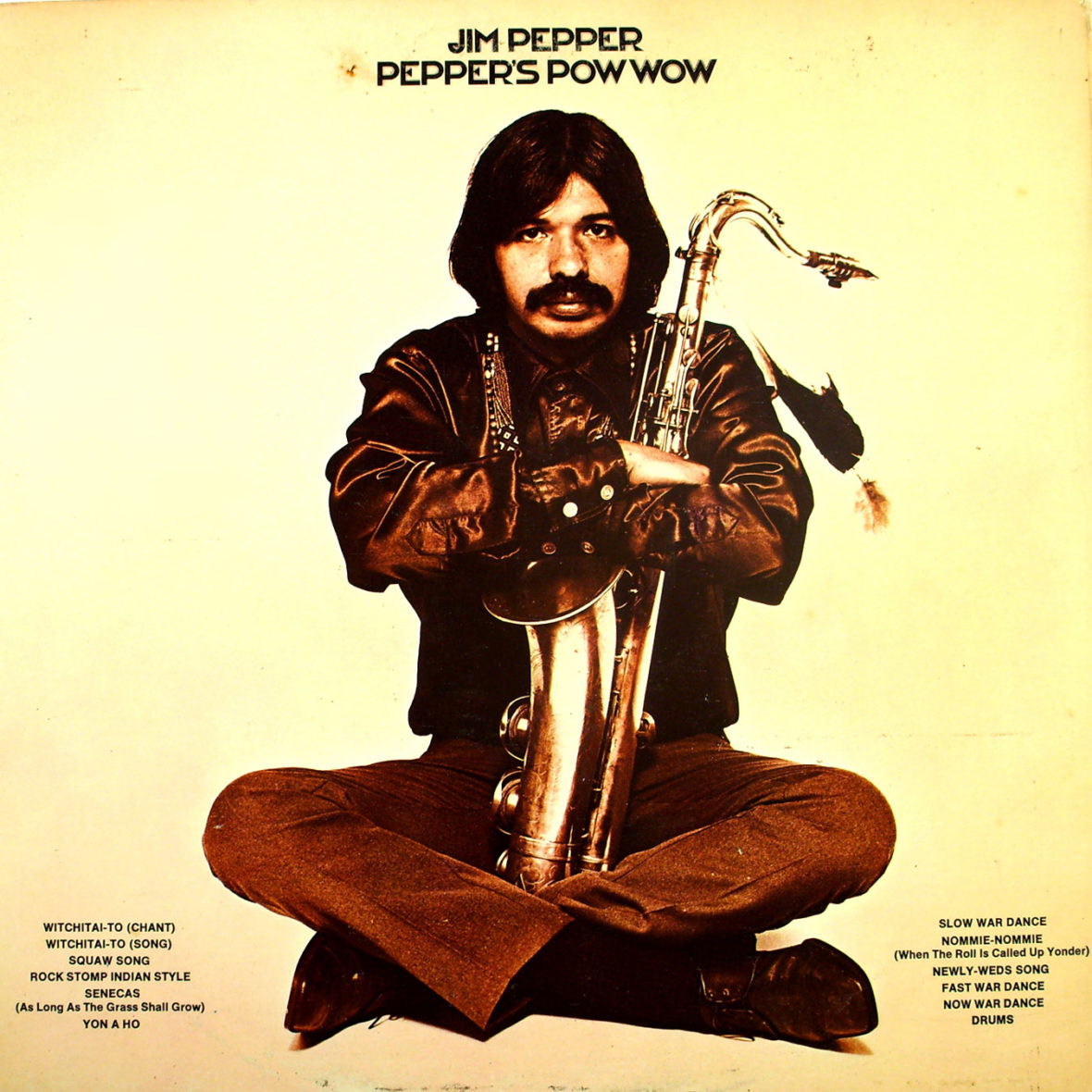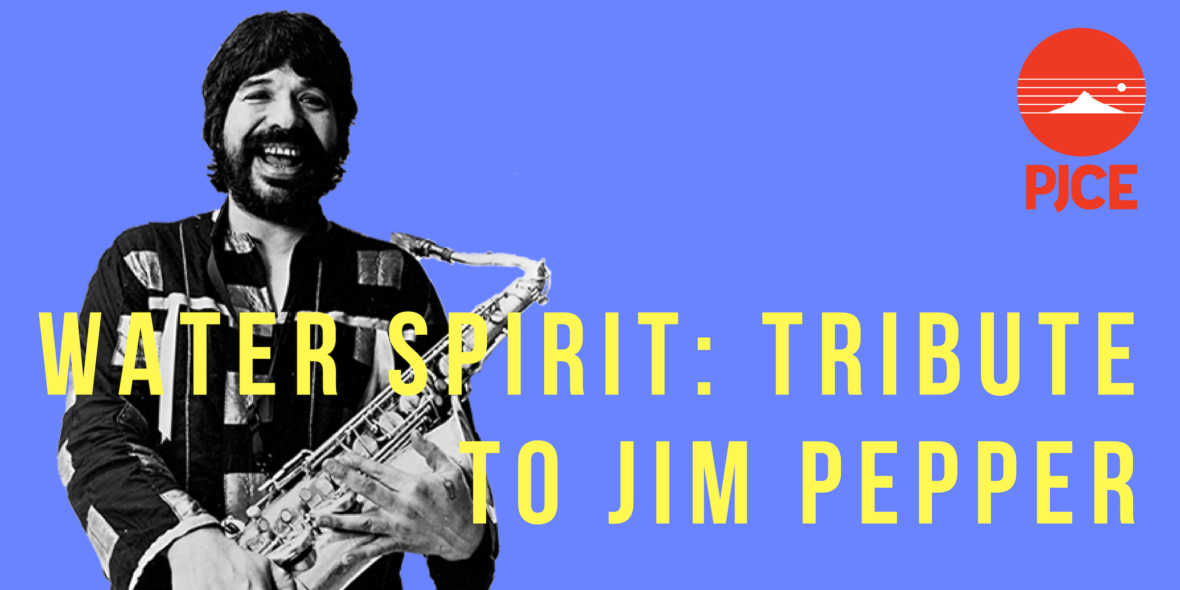PJCE fuses jazz with contemporary and traditional Native American music, featuring new compositions and arrangements by Gordon Lee, Clay Giberson, Farnell Newton, and Stephanie Kitson collaborating with hip hop artist 2 8 Tha Native.
Saturday, May 18th | 7 pm doors open | 8 pm concert The Old Church 1422 SW 11th Ave, Portland, OR 97201
Advanced Tickets: $25 Premium GA, $20 GA, $15 senior, $10 Youth 25 and under, $5 Arts for All.
Day of Show Tickets: $30 Premium GA, $25 GA, $20 senior, $15 Youth 25 and under, $5 Arts for All.
Portland Jazz Composers Ensemble (PJCE) honors the music and creative process of Oregon-born saxophonist Jim Pepper (Kaw/Creek) with a concert of new music on Saturday, May 18th at 8 pm at The Old Church. Going far beyond Pepper’s chart-topping hit “Witchi Tai To,” PJCE showcases how Native artists have been and are a vital part of to Portland’s creative music scene in new Pepper-inspired compositions by Gordon Lee and Clay Giberson and arrangements by Farnell Newton and Stephanie Kitson of songs by guest hip hop artist 2 8 Tha Native. Hip hop artist Kunu will be a special guest.
In an additional free event at the Oregon Historical Society on Friday, May 10th from noon to 1 pm, jazz writer Rick Mitchell, author of Jazz in the New Millennium: Live and Well, will give an introduction of Pepper’s work in the context of jazz’s broader story. His introduction will be followed by a discussion about Pepper’s legacy and contemporary Native artists in Portland and a performance by Gordon Lee and 2 8 Tha Native.
About the Concert
Gordon Lee, a Pepper bandmate for many years and mainstay of the Portland scene, offers an arrangement of Pepper’s “Remembrance” and a new work commissioned by PJCE in a tribute to his friend and colleague. Guest 2 8 Tha Native (Fish Martinez), a hip hop artist and traditional singer and dancer, will collaborate on his songs arranged for PJCE’s 12-member jazz ensemble by Farnell Newton and Stephanie Kitson and on an original piece by Clay Giberson. The concert will also include Gordon Lee accompanying 2 8 Tha Native as he performs a traditionally-inspired song dedicated to his son.
Many concerts have been staged in honor of Pepper’s contributions to American music. PJCE’s will feature some music by Pepper but will focus more on Pepper’s creative process itself, fusing jazz with other forms of music that express the world of indigenous people. Hip hop has emerged as a contemporary idiom of particular importance for Native artists across the country, and — in the spirit of Jim Pepper — PJCE’s concert brings representatives of that movement into contact with its large jazz ensemble, letting jazz composers and improvisers add their creative energy to the impact of the lyrics.
Gordon Lee and 2 8 Tha Native also perform and speak about Pepper’s legacy and contemporary Native artists in Portland at a free event at the Oregon Historical Society on Friday, May 10th from noon to 1 pm.
Gordon Lee, a Pepper bandmate for many years and mainstay of the Portland scene, offers an arrangement of Pepper’s “Remembrance” and a new work commissioned by PJCE in a tribute to his friend and colleague. Guest 2 8 Tha Native (Fish Martinez), a hip hop artist and traditional singer and dancer, will collaborate on his songs arranged for our 12-member jazz ensemble by Farnell Newton and Stephanie Kitson, and on an original piece by Clay Giberson. In addition, Gordon Lee will accompany 2 8 Tha Native as he performs a traditionally inspired song dedicated to his son, in an intimate duo performance that will offer a contrast to the full ensemble material.
Many concerts have been staged in honor of Pepper’s contributions to American music. Ours will feature some music by Pepper, as others have done, but will focus more on Pepper’s creative process itself. Hip hop has emerged as a contemporary idiom of particular importance for Native artists across the country, and — in the spirit of Jim Pepper — our concert brings representatives of that movement into contact with our large jazz ensemble, letting jazz composers and improvisers add their creative energy to the impact of the lyrics.
Composers and Arrangers




Guest Artists


About Jim Pepper

Tenor saxophonist, composer, and singer Jim Pepper was an internationally recognized and widely influential jazz musician. He is best remembered for “Witchi-Tai-To,” his elaboration of a Comanche peyote chant learned from his grandfather Ralph Pepper, a ceremonial leader of the Kaw Tribe in Oklahoma. “Witchi-Tai-To” may be the most recorded and performed Native American song of all time.
Born in Salem, Oregon, on June 18, 1941, Pepper was raised in the Parkrose District of Portland. He began moving between cultures as a dancer during his early teens. Encouraged by his parents, Gilbert and Floy Pepper, he alternated between tap and Indian dancing at school assemblies, powwows, and on Portland television with Grandfather Ralph.
Pepper’s mercurial career is best characterized as a crossing of boundaries—musical, cultural, and social. The consequences were both magnificent and painful. Pepper favored the large tone and muscular attack of the eastern, hard-edged jazz of the 1960s, and he developed an exceptionally distinctive sound. His was a music of extremes, blistering rapid runs over and around the chord changes at one pole, caressing balladry at the other. The success of “Witchi-Tai-To,” led him to alternate mainstream and avant-garde jazz with performances of Creek, Lakota, Caddo, and other American Indian songs. The bulk of his recordings were produced in Germany, which accounts for the general inaccessibility of his music in the United States.
Pepper had a lifelong fascination with the interface between Native and African Americans and considered a State Department-sponsored tour of West Africa in 1980 to be a defining experience. For an urban, largely assimilated, half-blood Indian, village life in Africa (performances were in the bush, not concert halls) vivified a connection with the traditional life of his origins. The tour was organized by Don Cherry (Afro-American and Choctaw), an influential figure in jazz and world music.
Lymphoma ended Pepper’s life in 1992 when, according to all accounts, he was on the cusp of international fame. Since then, scores of Pepper memorial concerts have been staged in the United States and Europe, including one arranged and conducted by Pulitzer Prize-winning composer and jazz scholar Gunther Schuller. – Adapted from “Jim Pepper (1941-1992)“ Oregon Encyclopedia by Jack Berry, a publication of The Oregon Historical Society.

